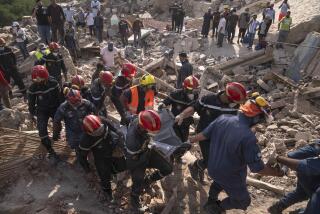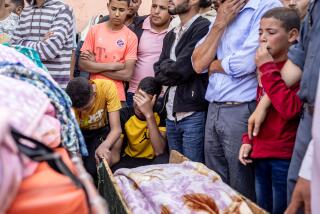Ancient Kingdom Struggles to Confront 21st Century : Morocco: King Hassan II and his band of technocrats are trying to make a free-market model for the Third World, rapidly shaping an export-driven economy.
MARRAKECH, Morocco — The peasant woman and her children barely looked up from reaping wheat when a fleet of limousines roared by, full of dignitaries who had just pushed the world trading system into the 21st Century.
Morocco’s leaders want to take their ancient kingdom there too, but will have to make radical changes first.
King Hassan II and his band of technocrats are trying to make a free-market model for the Third World, rapidly shaping an export-driven economy that will, they hope, become to Europe what Mexico has been to the United States.
But the impressive strides made in textiles, electronics assembly and agriculture coexist with poverty, illiteracy, corruption and enduring, if declining, human-rights abuses.
“Morocco dreams of being a new dragon,” said Abdelaziz Benani, vice president of the Moroccan Human Rights Organization. “Well, to be a new dragon, you can’t be illiterate. You can’t wait for people to have decent lives to give them political freedom.”
Political reforms are coming to Morocco more slowly than economic change. International pressure on Hassan to loosen his authoritarian rule eased quickly after Islamic fundamentalists began an insurgency in neighboring Algeria in 1992.
In response to modest democratic reforms in the last two years, the United States and Europe now portray Morocco as an island of stability in an uncertain region.
The seal of approval was the April conference of delegates from 120 nations who signed a trade treaty in Marrakech, an oasis city refurbished for the occasion with road repairs and new paint. Officials of the General Agreement on Tariffs and Trade described Morocco as an economic succcess story worthy of emulation.
Human rights groups say the government lured hundreds of unemployed people off the streets of Marrakech before the conference with promises of work, then sent them to a military camp. Police officials confirmed that about 3,000 people considered undesirable were cleared out of the city.
Unlike most other African countries, Morocco strictly followed World Bank directives over the last decade, slashing spending and the national debt. The currency is convertible and 112 state-owned companies are being sold to private investors.
Like Mexico, Morocco has become a low-income manufacturing center for a richer neighbor, in this case the European Union, which grants preferential import duties. Eventually, Morocco wants to become an EU member.
Wealth is unevenly distributed in Hassan’s kingdom. Industrial workers earn the equivalent of 75 cents an hour and peasants lead a hand-to-mouth existence little changed since the Middle Ages. The rural poor migrate to cities in search of work.
Morocco’s economy cannot generate enough jobs for its 26 million people, three-quarters of whom are under 35.
Half of the men cannot read or write. Illiteracy among women is 68% nationally, 90% in the countryside.
Desperate people seek to emigrate to Europe, which is closing the doors to deal with its own high unemployment. Some people have drowned in boats that sank trying to cross the Strait of Gibraltar to Spain. Officials are occasionally arrested for selling visas.
Ordinary people complain of police brutality and official corruption, but are careful not to criticize the king. That can bring a long prison term.
An oft-recounted illustration is the fund raising for the world’s largest mosque in Casablanca, named for the king and opened last year.
Hassan asked his subjects to donate what they could. Most interpreted that to mean a few dirhams, worth about 10 cents each.
Widely circulated stories have it, however, that officials at every level took their cut and local police shook people down for arbitrary sums, threatening them with jail if they refused to pay. Authorities deny the allegations.
“Foreigners think Morocco is the desert, but it’s more like the sea--the big fish eat the little fish,” said a Marrakech man who would not give his name for fear of retaliation.
The sea is becoming a little safer, at least for recognizable fish. Hassan named a deputy minister for human rights in 1993 and some well-known political prisoners have been freed.
But last year’s U.S. State Department human rights report cites evidence that three prisoners died of police torture, and human rights groups say dozens of people have “disappeared” in the last 20 years while in custody.
More to Read
Sign up for Essential California
The most important California stories and recommendations in your inbox every morning.
You may occasionally receive promotional content from the Los Angeles Times.










